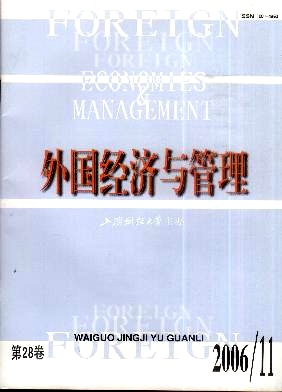知识型员工绩效影响因素研究回顾与展望
外国经济与管理 2006 年 第 28 卷第 11 期, 页码:59 - 65
摘要
参考文献
摘要
随着知识经济在全球范围内的兴起以及信息技术的飞速发展,企业之间的竞争,知识的创造、利用与增值,资源的合理配置,最终都要靠知识的载体———知识型员工来实现。如何提高知识型员工的绩效已成为现代企业面临的重要挑战之一。本文在总结分析了国外相关文献的基础上,对国外企业知识型员工绩效影响因素的研究成果进行了综述,提出了企业知识型员工绩效影响因素的层次概念模型构想,并对将来的研究方向进行了展望。
[1]Peter F Drucker.Management challenges for the 21st century[M].Boston,MA:Butterworth Heinemann Press,1999.
[2]Future Work.Workforce of the 21st century[R].Accenture Co.,1998.
[3]Brumbrach.Performance management[M].London:The Cronwell Press,1988:15.
[4]Kein J Murphy,and Michael C Jensen.Performance pay and top-management incentives[J].Journal of Political Econo-my,1998,2:225-264.
[5]Vroom,Victor H.Work and motivation[M].Toronto:John Wiley&Sons,1964.
[6]Libby,R.Availability and the generation of hypotheses in analytical review[J].Journal of Accounting Research,1985,23(2):648-667.
[7]Waldman,D A,and Spangler,W D.Putting together the pieces:a closer look at the determinants of job performance[J].Human Performance,1989,2:29-59.
[8]Cardy,R L,and Dobbins,G H.Performance appraisal:alternative perspectives[M].Cincinnati,OH:SouthwesternPress,1994.
[9]Waldman,M.Systematic errors and the theory of natural selection[J].American Economic Review,1994,84:482-497.
[10]Tampoe,M.Motivating knowledge workers:the challenge for the 1990s[A].Tampoe,M(Ed.).Knowledge manage-ment and organizational design[C].Boston,MA:Butterworth Heinemann Press,1996:179-190.
[11]Kristof,A L.Person-organization fit:an integrative review of its conceptualizations,measurement,and implications[J].Personnel Psychology.1996,49:1-49.
[12]Goodman,S A,and Svyantek,D J.Person-organization fit and contextual performance:do shared values matter?[J].Journal of Vocational Behavior,1999,55(2):254-275.
[13]Abraham,R.Emotional intelligence in organizations:a conceptualization[J].Genetic,Social&General PsychologyMonographs,1999,125(2):209-224.
[14]Campion,M,Pursell,E,and Brown,B.Structured interviewing:raising the psychometric properties of the employ-ment interview[J].Personnel Psychology,1988,41:25-42.
[15]Parker,C P,Baltes,B B,Young,S A,Huff,J W,Altmann,R A,Lacost,H A,and Roberts,J E.Relationshipsbetween psychological climate perceptions and work outcomes:a meta-analytic review[J].Journal of Organizational Be-havior,2003,24:389-416.
[16]Jeffrey Pfeffer.Six dangerous myths about pay[J].Harvard Business Review,1998,(May/Jun.):109-119.
[17]Peter F Drucker.The coming of the new organization[J].Harvard Business Review,1988,(Jan./Feb.):45-53.
[18]Peter F Drucker.Knowledge-worker productivity:the biggest challenge[J].California Management Review,1999,41(2):79-85.
[19]Minzberg,H.Covert leadership:notes on managing professional[J].Harvard Business Review,1998,(Nov./Dec.):140-147.
[20]McClelland,D C,and Burnham,D H.Macht motiviert manager fuhren nur gut,wenn sie ihre Macht fur das Unterneh-men einsetzen[J].Harvard Business Review(Reprint),2003,(Apr.):84-95.
[2]Future Work.Workforce of the 21st century[R].Accenture Co.,1998.
[3]Brumbrach.Performance management[M].London:The Cronwell Press,1988:15.
[4]Kein J Murphy,and Michael C Jensen.Performance pay and top-management incentives[J].Journal of Political Econo-my,1998,2:225-264.
[5]Vroom,Victor H.Work and motivation[M].Toronto:John Wiley&Sons,1964.
[6]Libby,R.Availability and the generation of hypotheses in analytical review[J].Journal of Accounting Research,1985,23(2):648-667.
[7]Waldman,D A,and Spangler,W D.Putting together the pieces:a closer look at the determinants of job performance[J].Human Performance,1989,2:29-59.
[8]Cardy,R L,and Dobbins,G H.Performance appraisal:alternative perspectives[M].Cincinnati,OH:SouthwesternPress,1994.
[9]Waldman,M.Systematic errors and the theory of natural selection[J].American Economic Review,1994,84:482-497.
[10]Tampoe,M.Motivating knowledge workers:the challenge for the 1990s[A].Tampoe,M(Ed.).Knowledge manage-ment and organizational design[C].Boston,MA:Butterworth Heinemann Press,1996:179-190.
[11]Kristof,A L.Person-organization fit:an integrative review of its conceptualizations,measurement,and implications[J].Personnel Psychology.1996,49:1-49.
[12]Goodman,S A,and Svyantek,D J.Person-organization fit and contextual performance:do shared values matter?[J].Journal of Vocational Behavior,1999,55(2):254-275.
[13]Abraham,R.Emotional intelligence in organizations:a conceptualization[J].Genetic,Social&General PsychologyMonographs,1999,125(2):209-224.
[14]Campion,M,Pursell,E,and Brown,B.Structured interviewing:raising the psychometric properties of the employ-ment interview[J].Personnel Psychology,1988,41:25-42.
[15]Parker,C P,Baltes,B B,Young,S A,Huff,J W,Altmann,R A,Lacost,H A,and Roberts,J E.Relationshipsbetween psychological climate perceptions and work outcomes:a meta-analytic review[J].Journal of Organizational Be-havior,2003,24:389-416.
[16]Jeffrey Pfeffer.Six dangerous myths about pay[J].Harvard Business Review,1998,(May/Jun.):109-119.
[17]Peter F Drucker.The coming of the new organization[J].Harvard Business Review,1988,(Jan./Feb.):45-53.
[18]Peter F Drucker.Knowledge-worker productivity:the biggest challenge[J].California Management Review,1999,41(2):79-85.
[19]Minzberg,H.Covert leadership:notes on managing professional[J].Harvard Business Review,1998,(Nov./Dec.):140-147.
[20]McClelland,D C,and Burnham,D H.Macht motiviert manager fuhren nur gut,wenn sie ihre Macht fur das Unterneh-men einsetzen[J].Harvard Business Review(Reprint),2003,(Apr.):84-95.
引用本文
严鸣, 林迎星. 知识型员工绩效影响因素研究回顾与展望[J]. 外国经济与管理, 2006, 28(11): 59–65.
导出参考文献,格式为:
上一篇:西方消费者介入研究综述
下一篇:组织内部信任理论研究述评





 6974
6974  0
0

